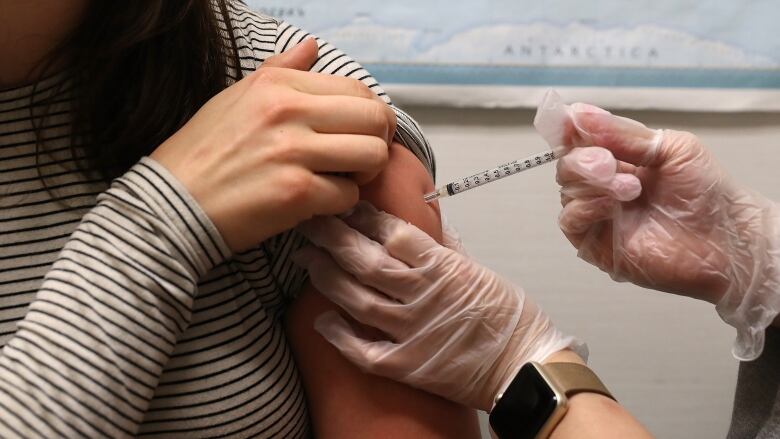33 flu-related deaths in N.L. as number of cases jumps
There were 778 flu cases, up 50 per cent, province's chief health officer says

A higher percentage of the province was vaccinated against influenza this year, but it didn't stop Newfoundland and Labrador from having a rough flu season.
There have been 778 confirmed cases of influenza in the province so far this flu season, compared to 519 the previous one, said Dr. Claudia Sarbu, Newfoundland and Labrador's chief medical officer of health.
'We haven't seen these high numbers in the last five years, Iwould say," Sarbu said.
Hospitalization was required in 269 of those cases and there have been 33 influenza deaths so far this year, compared to 14 deaths last year, she told the Central Morning Show Thursday.
Sarbu said 90 per cent of the deaths involved people over 65.
Thejump in flu cases came despite a large flu shot campaign by the provincial health department, and an increase in the percentage of the population that receivedthe shot.
Provincially, 22 per cent of the population got the flu shot this year compared to 20 per cent last year, Sarbu said.
2 reasons for a bad flu year
There are two factors that contributed to what Sarbu called a "very nasty flu season" in Newfoundland and Labrador, both of them related to the types of flu strains that circulated.
There are two kinds of influenza that circulate, A strain and B strain. Flu viruses mutate annually, and it's common that there are several sub-strains of the flu going around each year.
This year the dominant sub-strainofinfluenza A was a particularly bad one:H3N2.
- Flu shot less than 20% effective for most common strain this season, scientists find
- Flu activity in Canada 'high' and continuing to rise, latest public health numbers say
"This strain has a history that shows it causing more cases of flu, and automatically more cases of death," Sarbu said.
"When we see this circulating we should expect that these cases are more severe, we have more hospitalizations and therefore we will see more deaths."
The second factor that contributed to the high flu numbers was the influenza B strain that made the rounds this season.
This strain was not as nasty, Sarbu said, but it did start showing up earlier than normal. Influenza B is usually seen in the spring in Canada, but it actually began appearing last fall. A longer flu season means a worse one.
'My recommendation is to get the flu shot'
This year's flu shot was also not a good match for the strains in circulation, Sarbu said. Canadian research showed that the current vaccine effectiveness against H3N2 was only 17 per cent.
"When we have years with mismatch of the vaccine, we will see more cases," she said.
"But what Iwould like to tell people is that even if the vaccine is a mismatch, those who get the flu shots typically will have milder symptoms if they get the flu."
The vaccine covers four strains, two A and two B, and all of those strains are currently circulating, she said.
Getting the shot protects not only your own health but also those of people who are less protected from influenza, who cannot get the shot, or who are likely to feel the effects of the flu more severely. That includes children younger than six, people with chronic medical conditions, people who are immunocompromised, and pregnant women.
Newfoundlanders and Labradorians older than 65 had the highest immunization rate this year, agood development sincethey are a higher-risk group, Sarbusaid.
Only 11 per cent of those aged between five and 19 years got the flu vaccine this year, she said, which showsthat group should be targeted in future awareness campaigns especially aschildren often spread the disease, and will have a particularly strong immune response.
If you haven't gotten the shot yet, it's not too late: the flu season is on the downswing in the province, but it's not over, and it began declining only in the past couple of weeks.
"In Newfoundland, the season started later than in the rest of the country, so Ithink we peaked toward the end of March," Sarbu said.
"So it's not over yet, but we've started to see the decline."
With files from Central Morning and On The Go












_(720p).jpg)


 OFFICIAL HD MUSIC VIDEO.jpg)
.jpg)



























































































